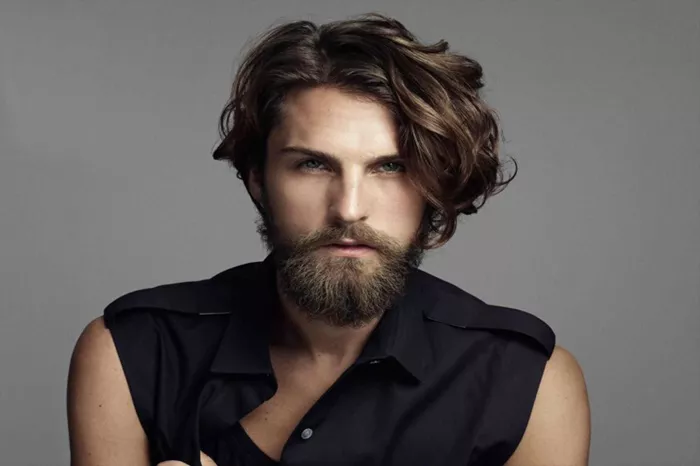When it comes to attractiveness, hairstyles play a significant role. The debate over whether longer hair is more attractive for men has been ongoing for years. Cultural preferences, personal tastes, and fashion trends all contribute to the perceptions of men’s hairstyles. In this article, we will explore various factors that influence the attractiveness of longer hair on men, including historical perspectives, cultural influences, psychological aspects, and practical considerations.
Historical Perspectives
Throughout history, men’s hairstyles have varied greatly across different cultures and time periods. In ancient times, long hair was often associated with strength, virility, and nobility. For instance, in many warrior cultures, long hair was a symbol of power and bravery. The Vikings, known for their fierce warriors, often depicted with long flowing hair, exemplify this association.
In contrast, during the Roman Empire, shorter hair was preferred among men, symbolizing discipline and social status. Roman soldiers, for instance, kept their hair short for practicality and hygiene during battles. This preference for shorter hair continued into the Middle Ages in Europe, where knights and noblemen often sported short hairstyles to signify their social standing and adherence to societal norms.
Cultural Influences
Different cultures have varying perceptions of men’s hairstyles. In many Eastern cultures, long hair has been seen as a sign of wisdom and spirituality. For example, in ancient China, scholars and philosophers often grew their hair long as a symbol of their intellectual pursuits and connection to higher knowledge. Similarly, in India, long hair has been associated with spiritual growth and asceticism.
In contrast, Western cultures have often favored shorter hair for men, especially in professional and military contexts. However, during the 1960s and 1970s, longer hair became a symbol of rebellion and counter-culture in the West. The hippie movement embraced long hair as a rejection of conventional norms and a statement of freedom and individuality.
Psychological Aspects
Psychologically, hair can have a significant impact on how individuals perceive themselves and others. Hair is often considered a secondary sexual characteristic, and its length, style, and condition can influence perceptions of attractiveness, health, and personality traits.
SEE ALSO: How to Get Curly Hair Naturally and Permanently for Guys?
Perceptions of Masculinity and Femininity
Longer hair on men can evoke different responses based on cultural and personal biases. In some contexts, longer hair may be seen as more feminine, challenging traditional notions of masculinity. However, this perception is changing as societal norms evolve. Many people now view long hair on men as a statement of confidence and individuality rather than a challenge to their masculinity.
Perceptions of Personality
The length of a man’s hair can also influence how others perceive his personality. Long hair is often associated with creativity, non-conformity, and a laid-back attitude. Men with long hair may be seen as more artistic and open-minded. On the other hand, shorter hair is typically linked to discipline, professionalism, and conventionalism. These perceptions can vary widely depending on individual experiences and cultural contexts.
Practical Considerations
When considering whether longer hair is more attractive for men, practical aspects should also be taken into account.
Maintenance and Grooming
Long hair requires more maintenance and grooming compared to shorter styles. Regular washing, conditioning, and styling are necessary to keep long hair looking healthy and attractive. Men with long hair need to invest time and effort into their hair care routine, which may not be appealing to everyone. Conversely, shorter hair is easier to manage and requires less daily upkeep.
Versatility in Styling
One of the advantages of long hair is its versatility. Long hair can be styled in various ways to suit different occasions and moods. Men with long hair can experiment with ponytails, buns, braids, and loose waves. This versatility allows for greater self-expression and adaptability. However, shorter hair can also be styled in different ways, though the options may be more limited compared to long hair.
Work and Social Environments
The appropriateness of long hair in professional and social settings is another important consideration. In some industries, long hair may be seen as unprofessional or unconventional. Men working in corporate environments, for example, may face pressure to maintain shorter hairstyles to conform to workplace norms. In contrast, industries such as the arts, entertainment, and creative fields often embrace longer hair as a form of self-expression.
Personal Preferences and Individual Differences
Ultimately, the attractiveness of long hair on men is subjective and varies based on personal preferences and individual differences. Some people find long hair on men highly attractive, associating it with creativity, confidence, and uniqueness. Others may prefer shorter hair, viewing it as more traditional, clean-cut, and professional.
Media and Pop Culture Influences
Media and pop culture play a significant role in shaping perceptions of attractiveness. Celebrities, musicians, and actors with long hair often influence public opinion. For example, iconic figures such as rock stars and movie characters with long hair can make the style more appealing and desirable. The portrayal of long-haired men in films, television shows, and advertisements contributes to societal perceptions and trends.
Conclusion
In conclusion, whether longer hair is more attractive for men is a complex and multifaceted question. Historical perspectives, cultural influences, psychological aspects, practical considerations, and personal preferences all play a role in shaping perceptions of men’s hairstyles. Long hair can be seen as a symbol of strength, creativity, and individuality, but it also requires more maintenance and may not be suitable for all professional environments. Ultimately, the attractiveness of long hair on men is subjective and depends on individual tastes and cultural contexts. As societal norms continue to evolve, the acceptance and appreciation of diverse hairstyles for men are likely to grow, allowing for greater self-expression and personal choice.

